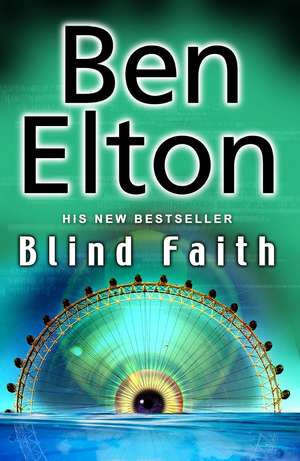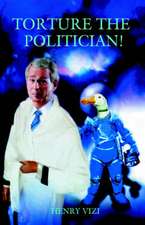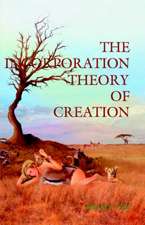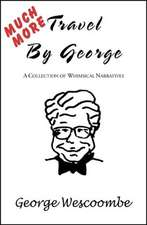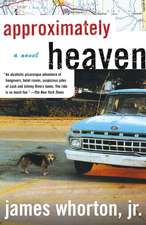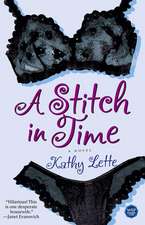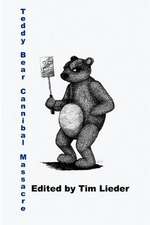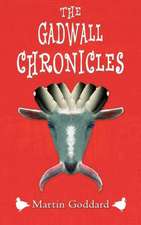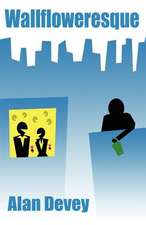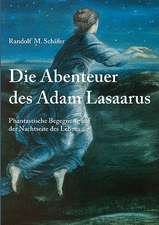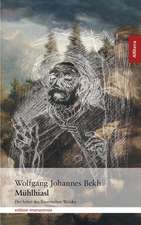Blind Faith
Autor Ben Eltonen Limba Engleză Paperback – 30 apr 2008
Imagine a world where everyone knows everything about everybody. Where what a person “feels” and “truly believes” is protected under the law, while what is rational, even provable is condemned as heresy. A world where to question ignorance and intolerance is to commit a Crime against Faith.
Imagine it. Or just wait until After The Flood.
On a hot Sagittarian morning in the year 56 ATF, Trafford Sewell struggles to work through the usual crowds of near-naked commuters. He is confronted by the intimidating figure of his Parish Confessor. Why has Trafford not been streaming his every moment of sexual intimacy onto the community website like everybody else? Does he think he’s different or special in some way? Better than his fellow man and woman? Does he have something to hide?
Ben Elton imagines a post-apocalyptic society where religious intolerance combines with a confessional sex-obsessed, self-centric culture to create a world where nakedness is modesty, ignorance is wisdom and privacy is a dangerous perversion. A chilling vision of what’s to come? Or something rather closer to what we call reality?
Preț: 68.55 lei
Preț vechi: 82.15 lei
-17% Nou
13.12€ • 13.73$ • 10.85£
Carte disponibilă
Livrare economică 20-26 martie
Livrare express 01-07 martie pentru 33.85 lei
Specificații
ISBN-10: 0552773905
Pagini: 366
Dimensiuni: 127 x 193 x 18 mm
Greutate: 0.25 kg
Editura: Black Swan Books, Limited
Colecția Black Swan
Notă biografică
Ben Elton¿s multi-award winning career as both performer and writer encompasses some of the most memorable and incisive comedy of the past thirty-five years. In addition to his hugely influential work as a stand-up comic, he was co-writer of TV hits The Young Ones and Blackadder and sole creator of The Thin Blue Line and Upstart Crow. He has written fifteen major bestsellers, including Stark, Popcorn, Inconceivable, Dead Famous, High Society, Two Brothers and Time and Time Again, three West End plays and three musicals, including global phenomenon We Will Rock You. He has written and directed two feature films, Maybe Baby and Three Summers.
He is married and has three children.
Extras
Trafford said goodbye to his wife, kissed their tiny baby on the forehead and began to unlock the various bolts and deadlocks that secured their front door.
‘And a very good morning to you too, Trafford,’ said the voice of Barbieheart.
‘Yes, of course, good morning, Barbieheart,’ Trafford replied nervously. ‘Good morning indeed, I mean goodbye . . . I mean . . . well, I mean I don’t want to be late, you see.’
‘I’m not holding you up, Trafford.’
‘No. Absolutely.’
‘Well now, you take care to have a great day.’
‘Thank you. Thank you very much. I will.’
Trafford’s wife looked at him angrily. He knew that Chantorria suspected him of deliberately not greeting Barbieheart, as some kind of protest, some bizarre bid for independence. She was right, of course.
‘Sometimes he doesn’t even say good morning to me,’ Chantorria volunteered apologetically, waving at Barbieheart’s face on the wallscreen.
She was only trying to suck up; Trafford knew Chantorria BLIND FAITH hated Barbieheart as much as he did. But trying to keep her sweet was the right thing to do, the safe thing to do. At least one member of the family had a sense of what was proper.
Barbieheart extracted her hand from the huge sack of cheesy snacks on which she was breakfasting and waved back. She was moderator of the tenement chat room and, having grown too large to leave her apartment, she was scarcely ever absent from her post. A constant presence in every household, Barbieheart was an extra member of the family and one whom Trafford deeply resented.
‘Go, go! Run, Trafford!’ Barbieheart said with exaggerated cheeriness. ‘It’s a brand new day, praise the Love.’
Trafford left his apartment and began to descend the many litter-strewn, rat-infested staircases to the street below. The lift worked but Trafford never used it. He claimed he liked to walk down for the exercise but really it was so that he could enjoy a few brief moments away from communitainment screens. He could never admit that, of course: it would look dangerously weird. After all, what was not to like about a news and entertainment video on the wall of a boring lift?
Out on the pavement Trafford headed for the tube station, picking his way carefully through the cellophane, the filthy pink ribbons, the rotting blooms, the little photographs, the scribbled-on scraps of paper and the gilt-edged cards:
Gathered unto the Lord.
One more star in the zodiac.
A new heartbeat in Heaven.
He knew better than to tread on a single kiss-laden message or wilted flower; he had seen men beaten senseless for less. They missed nothing, those keening women who gathered on the pavements in the heat of the morning to mourn their dead and broadcast to the street the age-old songs of grief.
I will always love you.
The heart must go on.
One foot wrong, one petal defiled, and that weeping, hugging huddle would without doubt consider themselves to have been shown disrespect. And disrespect was something for which, even in their grief, these women were constantly vigilant. Even a suspicion of disrespect would turn public sorrow instantly to public rage. The fuse was short, the tinder dry, it took almost nothing to summon forth the mob from the surrounding apartment buildings and spark an orgy of People’s Justice which the police would regret but not condemn. Many who fell victim to the righteous fury of the mob never understood what offence it was that they had unwittingly given, just as many who rushed to join the frenzied mêlée could only guess at what outrage the object of their fury had committed. Something to do with children, no doubt, because nobody dissed the people’s kiddies. Least of all the dead ones.
And there were so many dead ones.
Death was everywhere. In the buzz of insects’ wings, in the splashing of the dirty water and borne on the whisper of the wind. It stalked everybody, old and young alike, but it was the young who were the most vulnerable and they suffered most.
Libra Divine: Heaven has a brand new superstar.
Tyson Armani: Simply the best.
Malibu: A candle in the wind.
So many dead children. Millions and millions of them. No stretch of pavement without its shrine. No personal web page without its catalogue of tiny faces that had looked upon the world for such a short time but lived on now only in Heaven and in cyberspace.
My little sister.
My tiny cousin.
My boy. My girl.
All safe now in the arms of Jesus. And Diana. The Love Spirit and the Lord. Dead but safe. Safe, thank God, from paedophiles.
Sagiquarius: Pure for ever. Defiled, never.
Child mortality was the burning cross that branded the souls of the nation, the pain that the people must bear in repentance for the sins of their faithless forefathers. No child was safe: the plagues which swept through the community affected rich and poor alike. God’s great plan was no respecter of wealth or rank, although without doubt the more crowded the district, the more severe were the epidemics that afflicted it. Bumps and sores, boils and pustules, aching bones, running eyes and infected chests, these were the dangers that an infant must negotiate before it had even learned to walk. The mother who brought six babies into the world could only hope to take three of them to McDonald’s to celebrate their fifth birthdays. For half of them at least, the party sacks would never be filled.
Chantorria had recently given birth to their first child, a time of joy but also a time of grim trepidation. Like all new parents, she and Trafford had spent the weeks since their daughter’s arrival listening out for telltale coughs, watching for rashes and testing constantly for sensitivity to sound and light.
Now, however, it was time for Trafford to return to work and this particular day was a Fizzy Coff. Fizzy Coff was short for ‘physical office’ and meant that it was a day when Trafford’s personally adapted work structure required him to attend his actual workplace, as opposed to the virtual version which existed online and which he could get to without leaving his bed.
Fizzy Coffs were a statutory requirement; the law expected each person to spend at least 25 per cent of their working hours in the company of real, physical colleagues in a real physical space. It was intended at some point to increase this proportion to 50 per cent and the transport system was supposedly being updated to cope with the extra travel hours, but Trafford doubted that it would ever happen. All future planning for the transport system seemed to him to focus on the modest ambition of preventing it from grinding to a complete halt.
Fizzy Coffs were a relatively recent development. Twenty solstices previously, when Trafford had first entered employment, he had not been required to go out to a physical workplace at all. Few people did, except those whose job was serving food and drink or lapdancing. That had been in a time when the virtues of the virtual had gone unchallenged. The public health advantages of keeping people apart had been obvious and it was generally assumed that at some point all work would be done at home. But the growing trend towards social dysfunction had alerted both the Temple and the government to the human need for Face Time. Care workers and spiritual counsellors had concluded that people who dealt exclusively with virtual individuals tended to be at an emotional disadvantage when confronted with the real thing. Unable to relate to fellow members of the community, they were awkward, tongue-tied, and would occasionally shoot at random as many people as they could before turning their guns on themselves.
It had also become clear that it was impossible to meet a series of sexual partners while sitting alone in a tiny flat in front of a computer screen surrounded by pizza boxes. This had of course brought the Temple into the debate. With one in two children dying in infancy, the first and foremost spiritual duty of the people was to produce more children and you cannot produce children without sexual partners. The High Council of the Temple had therefore let it be known that the government must enable the people to interact more regularly, and so Fizzy Coffs became mandatory.
It was therefore principally in order to produce children and to prevent them from developing into deranged killers that Trafford found himself picking his way through the emotionally charged litter of a permanently traumatized society in the burning heat of a stinking Sagittarian morning.
